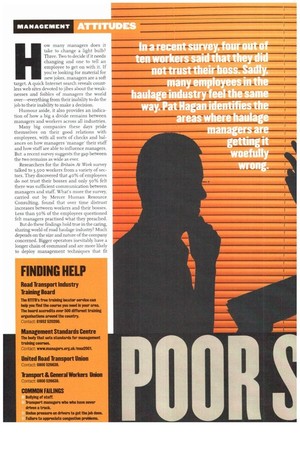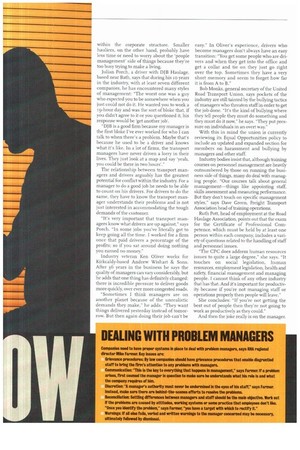1111 recent survey, four out of
Page 32

Page 33

If you've noticed an error in this article please click here to report it so we can fix it.
rkers said that they did not trust their boss. Sadly, many employees in the haulage industry feel the same way. Pat Hagan identifies the areas where haulage managers are getting it woefully
V wrong. 41WIL How many managers does it take to change a light bulb? Three. Two to decide if it needs changing and one to tell an employee to get on with it. If you're bolting for material for new jokes, managers are a soft target. A quick Internet search reveals countless web sites devoted to jibes about the weaknesses and foibles of managers the world over—everything from their inability to do the job to their inability to make a decision.
Humour aside, it also provides an indication of how a big a divide remains between managers and workers across all industries.
Many big companies these days pride themselves on their good relations with employees, with all sorts of checks and balances on how managers 'manage' their staff and how staff are able to influence managers. But a recent survey suggests the gap between the two remains as wide as ever.
Researchers for the Britain At Work survey talked to 3,500 workers from a variety of sectors. They discovered that 40% of employees do not trust their bosses and only 50% felt there was sufficient communication between managers and staff. What's more the survey, carried out by Mercer Human Resource Consulting, found that over time distrust increases between workers and their bosses. Less than 5o% of the employees questioned felt managers practised what they preached.
But do these findings hold true in the caring. sharing world of road haulage industry? Much depends on the size and nature of the company concerned. Bigger operators inevitably have a longer chain of command and are more likely to deploy management techniques that fit
within the corporate structure. Smaller hauliers, on the other hand, probably have less time or need to worry about the 'people management' side of things because they're too busy trying to make a living.
Julian Porch, a driver with DJB Haulage, based near Bath, says that during his to years in the industry, with at least seven different companies, he has encountered many styles of management: "The worst one was a guy who expected you to be somewhere when you just could not do it. He wanted you to work a 19-hour day and was the sort of bloke that, if you didn't agree to it or you questioned it, his response would be 'get another job'.
"DJ B is a good firm because my manager is the first bloke I've ever worked for who I can talk to when there's a problem. Maybe that's because he used to be a driver and knows what it's like. In a lot of firms, the transport managers have never driven a lorry in their lives. They just look at a map and say 'yeah, you could be there in two hours'."
The relationship between transport managers and drivers arguably has the greatest potential for conflict within the industry. For a manager to do a good job he needs to be able to count on his drivers. For drivers to do the same, they have to know the transport manager understands their problems and is not just interested in accommodating the tough demands of the customer.
"It's very important that transport managers know what drivers are up against," says Porch. "In some jobs you've literally got to keep going all the time. I worked for a firm once that paid drivers a percentage of the profits; so if you sat around doing nothing you earned no money."
Industry veteran Ken Oliver works for Kirkcaldy-based Andrew Wishart & Sons. After 36 years in the business he says the quality of managers can vary considerably, but he adds that one thing has definitely changed: there is incredible pressure to deliver goods more quickly, over ever more congested roads.
"Sometimes I think managers are on another planet because of the unrealistic demands they make," he adds. "They want things delivered yesterday instead of tomorrow. But then again doing their job can't be easy." In Oliver's experience, drivers who become managers don't always have an easy transition: "You get some people who are drivers and when they get into the office and get a collar and tie on they just go right over the top. Sometimes they have a very short memory and seem to forget how far it is from A to B."
Bob Monks, general secretary of the United Road Transport Union, says pockets of the industry are still tainted by the bullying tactics of managers who threaten staff in order to get the job done. "It's the kind of bullying where they tell people they must do something and they must do it now," he says. "They put pressure on individuals in an overt way."
With this in mind the union is currently reviewing its Equal Opportunities policy to include an updated and expanded section for members on harassment and bullying by managers and other staff.
Industry bodies insist that, although training courses on personnel management are heavily outnumbered by those on running the business side of things, many do deal with managing people. "Our courses talk about general management—things like appointing staff, skills assessment and measuring performance. But they don't touch on specific management styles," says Dave Green, Freight Transport Association head of training operations.
Ruth Pon, head of employment at the Road Haulage Association, points out that the exam for the Certificate of Professional Competence, which must be held by at least one person within each company, includes a variety of questions related to the handling of staff and personnel issues.
"The CPC does address human resources issues to quite a large degree," she says. "It touches on social legislation, human resources, employment legislation, health and safety, financial management and managing people. I cannot think of any other industry that has that. And it's important for productivity because if you're not managing staff or operations properly then people will leave."
She concludes: "If you're not getting the best out of people then they're not going to work as productively as they could."
And then the joke really is on the manager.
























































































































































